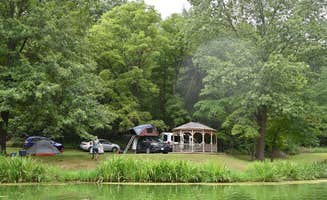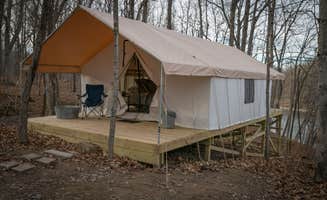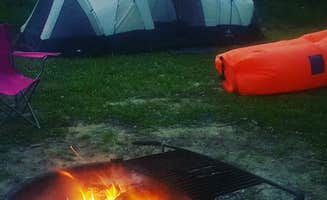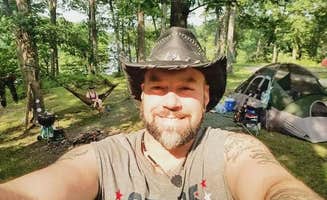Tent camping near Godfrey, Illinois offers accessible options within a 40-mile radius of the Mississippi River confluence. The region's terrain varies from river bottomlands to forested bluffs, with summer temperatures typically reaching 85-90°F and high humidity. Fall camping season extends through October with cooler temperatures and colorful foliage changes across the surrounding hardwood forests.
What to do
Hiking technical trails: At Klondike Park, campers can access multiple terrain types from a single location. One visitor noted, "Trails are beautiful and perfect for families wanting to just come to a park for a day and hikers." The park features white sand hiking areas formed from the remnants of silica sand mining operations.
Wine country exploration: Many tent sites provide access to Missouri's wine region. A camper at Klondike Park shared, "This Campground places you in the heart of Missouri Wine Country and there's a perfect base for visiting the wineries and restaurants along highway 94." Most wineries are open year-round with limited winter hours.
Fishing opportunities: Waverly Lake City Park offers tent sites with lake access for fishing. The campground maintains a 4-day consecutive stay limit per month. "It's quiet and peaceful, however there's not much to do. As far as I know there's no running water," reports one camper who visited multiple times.
What campers like
Affordability: Budget-conscious campers appreciate the low rates at many area campgrounds. One camper at St. Charles County Klondike Park mentioned, "Can't go wrong for a 10$ a night campsite with restrooms and water available." Most primitive sites in the region range from $10-15 per night.
Privacy options: Some campgrounds offer secluded sites away from other campers. At William R. Logan Conservation Area, a camper described finding "a lollipop loop with some really primitive and obviously rarely used campsites in the woods behind the main camp area." The main camping area has 8-10 established sites in an open circle configuration.
Wildlife viewing: Tent campers frequently mention wildlife encounters. A visitor to Waverly Lake warned to "Be mindful of field roaches and raccoons at night, as we had to learn the hard way the morning after our first night." Most wildlife sightings occur at dawn and dusk around campground perimeters.
What you should know
Limited facilities: Many tent sites have minimal amenities. At William R. Logan Conservation Area, a camper noted, "The only vault toilet was closed and a porta potty was set next to that." Several conservation areas require campers to pack out all trash.
Seasonal access changes: Winter camping often means reduced facilities. According to a visitor at Dr. Edmund A. Babler Memorial State Park, "Not having water available except at the camp host, and no open restrooms and showers until after April 1, regardless of when the last freeze is was inconvenient for a spring break trip."
Reservation requirements: Some parks require advance bookings. A camper at St. Charles County Klondike Park mentioned, "Reservations are required and the sites are in high demand." Most popular sites fill 2-3 weeks in advance during summer and fall weekends.
Tips for camping with families
Look for educational opportunities: McCully Heritage Project offers nature programs alongside camping. A visitor shared, "Ten dollars a night helps maintain land and natural area, all donation, very family oriented." The site includes nature trails with interpretive signage suitable for children.
Check playground access: Some campgrounds include play areas. A family who visited McCully Heritage Project mentioned, "I just love the bridge across the pond. We had a picnic and the kids got to play on the playground equipment."
Consider insect protection: Parents should prepare for insects during warm months. A camper at McCully warned, "Nice hiking trails near. Watch for ticks." Most campers recommend bringing insect repellent with at least 20% DEET for summer camping.
Tips from RVers
Check site terrain: Many campgrounds have uneven areas challenging for RVs. At Babler State Park, one RVer advised, "The camp hosts we encountered are very helpful and have a list of site lengths and can tell you which ones are appropriate for large RVs." Sites 13-33 at Babler are more open and level for RVs.
Know the power situation: RVers should check electrical options before arrival. According to a camper at Babler, "There is no sewer or water at individual sites but water spigots are scattered throughout the campground and there is a dump station with potable water fill-up." The park offers both 30-amp and 50-amp electric sites.
Consider the road network: Some campgrounds have access limitations. A Babler State Park visitor cautioned, "Not all sites are long enough for large RVs and the roads in some loops prevent you from turning around." The park's roads in some loops are clearly marked "short turning radius" to warn larger vehicles.





